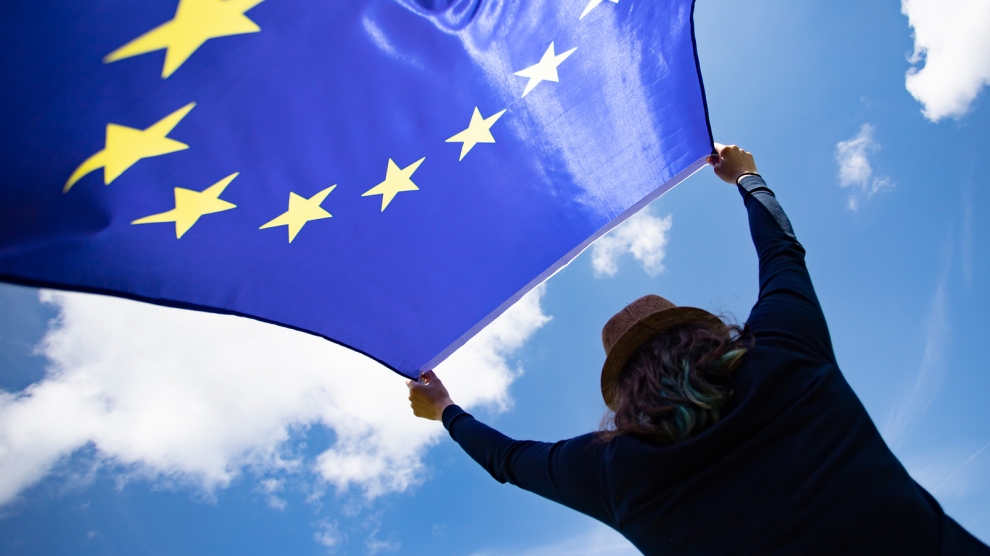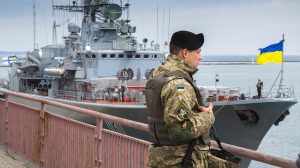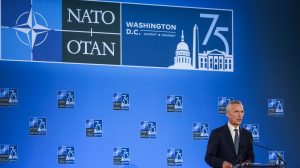Catch up quickly with the stories from Central and Eastern Europe that matter, this week led by news of renewed efforts in Brussels to kick-start Ukraine’s EU accession talks.
Russia’s war on Ukraine
Brussels officials are pushing to begin formal negotiations over Ukraine joining the European Union as early as next month, it was reported this week.
Behind the scenes, diplomats from the EU and from Kyiv are working intensively to try to persuade the Hungarian government to give its approval to opening talks on Ukraine’s accession.
Opening the talks would bring a morale boost to Ukraine, which has been fighting a full-scale Russian invasion for more than two years and has long aspired to join the Western bloc.
EU leaders told Ukrainian President Volodymyr Zelensky last December they wanted Ukraine and Moldova to join their club, potentially bringing its membership to 29 countries. But the formal legal procedure to start membership talks has been held up by opposition from Hungary.
Fighting around Ukraine’s second largest city has so far displaced around 14,000 people, according to the World Health Organisation (WHO).
Russian forces recently began a summer offensive, grabbing several villages on Ukraine’s north-eastern frontier near the city of Kharkiv as they attempt to break through a weakened Ukrainian front line.
Kharkiv’s regional leader said seven people had been hurt as a result of Russian drone strikes on the city overnight.
Meanwhile a Ukrainian drone strike across the border into Belgorod killed at least one person, according to Russian media.
Speaking at a press briefing this week, the WHO’s Jarno Habicht said that 14,000 had fled the fighting in the area, but the 189,000 people who remained near the border with Russia faced “significant risks due to ongoing fighting”.
Ukraine’s leading mobile operator Kyivstar this week said it allocated 90 million US dollars to deal with a suspect Russian cyberattack on its services and said it had hit its growth.
The money went towards repairing damage as well as on strengthening the system and funding a loyalty program for clients.
The hack, described by its CEO as the biggest cyberattack on telecoms infrastructure in the world, struck Kyivstar in December, damaging infrastructure and disrupting mobile phone signals for millions of Ukrainians.
“Before the cyberattack, we were moving with an increase of 11-12 per cent quarter-on-quarter in 2023. The cyberattack ate up about three per cent of annual growth,” CEO Oleksandr Komarov told the Interfax-Ukraine news agency.
Kyivstar, owned by Amsterdam-listed mobile telecoms operator Veon, has 24.3 million mobile subscribers, as well as more than 1.1 million home internet subscribers.
Other news from the region
Several EU countries are pushing for sanctions against Georgia, including the suspension of visa-free travel to the bloc, in response to the government’s defiant stance on its Russian-inspired “foreign agents” law. Georgia, an EU candidate country, has defied warnings from Brussels and months-long street protests, pressing ahead with the controversial law, which is similar to one already in place in Russia that obliges media and rights groups that receive foreign funding to register with the government.
Poland this week arrested nine members of an alleged Russian spy ring in connection with alleged sabotage plots, prime minister Donald Tusk said on Monday. “We currently have nine suspects detained and indicted, who have been directly implicated in the name of Russian (intelligence) services in acts of sabotage in Poland,” Tusk told private broadcaster TVN24. “These are Ukrainian, Belarusian and Polish citizens,” Tusk said, suggesting some may have been recruited from criminal circles. Tusk added that the Russian plots concern not just Poland, but also Lithuania, Latvia and possibly Sweden.
The arrests came just two days after Tusk announced that Poland is investing approximately 2.2 billion euros to enhance security and deterrence along its border with Russia and Belarus. Tusk revealed that the Shield-East project, which includes building military fortifications, has already begun. Emphasising Poland’s strategic position on NATO’s and the European Union’s eastern flank, Tusk highlighted the country’s responsibility for Europe’s security. He explained that the project entails constructing a fortified and environmentally modified border to ensure it is impenetrable by potential enemies.
Moldova this week signed a security and defence partnership with the European Union, the first country to ink such a pact, according to EU foreign policy chief Josep Borrell. “This partnership will strengthen the country’s resilience. It will allow for a joint approach to security challenges, make our engagement more effective, and explore new areas of cooperation,” Borrell said. Moldova, led by pro-Western President Maia Sandu, has expressed hopes of joining the EU and has strongly condemned Russia’s invasion of Ukraine.
Police in Kosovo this week closed six branches of a Serbia-licensed bank in line with the decision to ban of the use of the Serbian dinar in the country, a move that has raised tension with neighbouring Serbia. A police statement said they had closed branches of the Postal Savings Bank, following a request from financial institutions on their illegitimacy and based on an authorisation from the prosecutor’s office. Since February 1, areas dominated by the ethnic Serb minority in Kosovo have been forced to adopt the euro, which is used in the rest of the country.
The United Nations General Assembly on Thursday adopted a resolution establishing an annual International Day of Reflection and Commemoration of the 1995 Srebrenica Genocide, despite a campaign by Serbia and its allies against the resolution, which they claim demonises Serbs. Eighty-four countries voted for the resolution and 19 voted against. Another 68 countries abstained, while 22 did not vote. Of the Balkan and Central European countries, Serbia and Hungary voted against, Slovakia and Greece abstained, while the rest were in favour.
The Kyrgyz Interior Ministry said on May 22 that six Kyrgyz and four foreign citizens had been detained on suspicion of being involved in a brawl that sparked mob attacks on foreign students in Bishkek, triggering a mass exodus of Pakistani students from the Central Asian nation. According to the ministry, nine investigations have been launched into hooliganism, robbery, mass disorder, and inciting ethnic hatred. Thirty-three people were injured in the violence, the ministry added. Hundreds of Pakistani students have left Kyrgyzstan since the May 18 violence.
Ryanair this week opened a second hangar at Kaunas Airport in Lithuania, following a 20 million euros investment. The new hangar, for aircraft servicing and maintenance, sees the creation of more than 200 new positions in Kaunas (bringing the total employed to 400), including a significant number of highly skilled engineers and aircraft mechanics. “As the European aviation sector is closing in on pre-pandemic levels, Lithuania will support the continent’s largest carrier in meeting the increasing demand for aircraft maintenance and repair,” said Aušrinė Armonaitė, Lithuania’s Minister of Economy and Innovation.
On the roof of the mayor’s office in Albania’s capital Tirana, lesbians Alba Ahmetaj and Edlira Mara held an unofficial wedding ceremony on Sunday, a symbolic move they hope will promote LGBT+ rights in the country. Guests threw white petals as the couple, dressed in white gowns, approached the altar that overlooked the city centre. When the ceremony finished, they kissed, and hugged their three-year-old twin daughters. Same sex marriage is not allowed in Albania, and their partnership will not be recognised by the state. But the couple, who were wed by two British pastors, wanted to send a message.
Unlike many news and information platforms, Emerging Europe is free to read, and always will be. There is no paywall here. We are independent, not affiliated with nor representing any political party or business organisation. We want the very best for emerging Europe, nothing more, nothing less. Your support will help us continue to spread the word about this amazing region.
You can contribute here. Thank you.






Add Comment